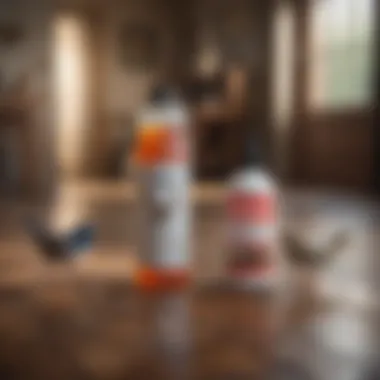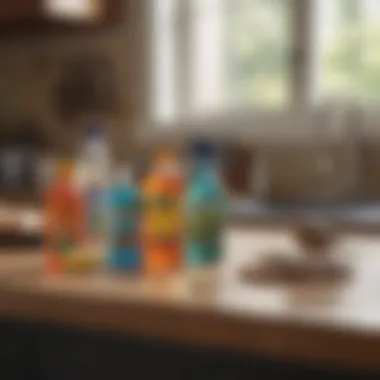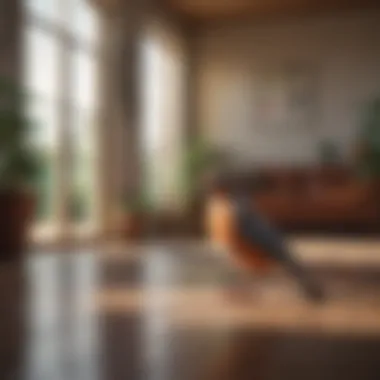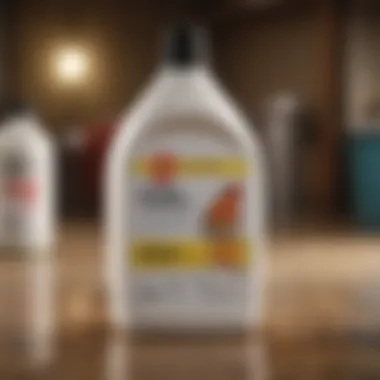A Comprehensive Guide to Bird Safe Floor Cleaners


Intro
When one chooses to share their home with birds, certain measures must be taken to ensure a safe environment. This guide aims to explore the various factors to consider when selecting floor cleaners that are safe for these avian companions. Conventional cleaning products can pose serious health risks for birds, as their respiratory systems are particularly sensitive to chemical exposure. Therefore, it is crucial to be informed about the substances that are harmful and to identify viable alternatives.
You will learn about key ingredients to avoid, recommended bird-safe products, and even some effective DIY cleaning solutions. Understanding how to maintain a clean space without jeopardizing the health of your feathered friends is an essential skill for any bird owner.
Understanding Your Pet
Understanding your pet bird is the first step in providing a safe environment. It's not only about knowing your pet's specific needs but also understanding their behavior and characteristics. This knowledge helps in choosing the right cleaning products that won't unintentionally harm them.
Pet Behavior Basics
Birds are highly social and intelligent creatures. They communicate through vocalizations and body language. Understanding these behaviors allows owners to better gauge their birds' well-being and stress levels, especially when introducing new cleaning products into the home.
Common Breed Characteristics
Different breeds of birds have differing sensitivities and health requirements. For instance, parrots are known to be more susceptible to certain chemicals compared to finches. Knowing your bird’s breed can help you make informed choices about cleaning products and their potential impact on your pet.
Species-Specific Needs
Some birds, such as cockatiels and budgerigars, might have specific requirements that need to be considered when selecting a cleaner. House cleaning solutions should be free of harmful chemicals that can adversely affect their respiratory health. Awareness of these needs ensures that your bird can thrive in a clean, safe environment.
Always prioritize the health and safety of your birds when choosing cleaning products.
The next sections of this guide will explore more practical aspects, such as pet care and maintenance, which include proper hygiene practices. The following discourse will aid you in keeping your home both clean and bird-friendly.
Understanding the Importance of Bird Safety
Birds are not just pets; they are companions with unique needs. Ensuring their safety is paramount when it comes to maintaining a healthy indoor environment. This section delves into why bird safety should be a priority for bird owners, focusing on specific elements that underscore the significance of choosing safe cleaning products.
Why Birds Are Unique Pets
Birds have distinct behaviors and physiological characteristics that set them apart from traditional pets like dogs and cats. They are sensitive animals, both physically and emotionally. Their respiratory systems are particularly delicate, making them susceptible to inhaling harmful substances found in common household cleaners. Birds are highly social creatures and their well-being can be deeply affected by their environment.
The interaction between a bird's health and its surroundings is crucial. Unlike larger animals, birds can easily be overwhelmed by strong odors or toxic fumes. This makes understanding the products used in their environment essential for their longevity and quality of life.
Common Hazards in Indoor Environments
Indoor settings often present a variety of hazards that can go unnoticed until it's too late. Many household products contain chemicals that are safe for humans but harmful to birds. For instance, air fresheners, cleaning agents, and even some scented candles can emit volatile organic compounds (VOCs) that can irritate a bird’s sensitive respiratory system.
Furthermore, common cleaning practices can lead to exposure to dangerous substances. Simple tasks like mopping or wiping surfaces can release fumes that linger in the air. The accumulation of these chemicals can create a toxic environment for birds, potentially leading to serious health issues.
To protect our feathered friends, it is essential to identify and minimize these risks through informed choices about the cleaning products and methods we use.
Birds often show no visible signs of distress until serious illness occurs. Regular assessments of the cleaning environment are vital for their health.
The Risks of Conventional Cleaners
The use of conventional cleaners in homes with birds poses significant risks. Understanding these dangers is essential for any pet owner who prioritizes the health and safety of their feathered companions. Many standard cleaning products contain harmful substances that can jeopardize the well-being of birds. Evaluating these potential risks can guide bird owners in making informed choices about cleaning products.


Toxic Ingredients in Traditional Cleaners
Most traditional cleaners contain toxic ingredients. These are often designed to cut through grease, stains, and dirt effectively. However, the very chemicals that make these products effective can be hazardous to birds. Ingredients like bleach, ammonia, and formaldehyde are commonly found in many household cleaners.
- Bleach: While used widely for disinfection, bleach can irritate the respiratory system of birds. Inhaling fumes could lead to severe health issues.
- Ammonia: This potent cleaner can cause breathing problems and irritation in birds. Effects can range from mild respiratory distress to severe lung damage.
- Formaldehyde: Known for its preservative qualities, formaldehyde poses a dangerous threat when birds encounter fumes. It's linked to various health issues, including eye irritation and respiratory problems.
Birds have unique biology that makes them especially susceptible to these agents. They possess sensitive respiratory systems which can react adversely to even small amounts of these chemicals.
Effects of Fumes on Birds
Fumes from conventional cleaners can have detrimental effects on birds. Birds are not only more affected by fumes than humans, but they can also experience irreversible damage to their health. For instance, exposure to cleaners with strong fumes can lead to acute respiratory distress and, in extreme cases, can be fatal.
The following are some potential effects of fumes:
- Respiratory Issues: Prolonged exposure may lead to chronic conditions such as bronchitis or pneumonia.
- Nervous System Effects: Chemicals can affect the nervous system, leading to changes in behavior, coordination, or even severe neurological issues.
- Sensory Irritations: Birds may also experience irritation of their eyes or skin, making them uncomfortable in their own environment.
Identifying Bird Safe Floor Cleaners
Choosing safe cleaning products is paramount for bird owners. Conventional cleaners often contain harmful chemicals. Identifying bird-safe floor cleaners ensures a clean home while minimizing health risks to your pets. In this section, we will explore the key characteristics of safe cleaning products and the certifications that indicate safety and efficacy.
Key Characteristics of Safe Cleaning Products
When selecting a floor cleaner suitable for a home with birds, there are several characteristics to consider:
- Non-toxic Ingredients: The cleaning product should be free from toxic chemicals like bleach, ammonia, or formaldehyde. These substances can trigger respiratory issues in birds and may lead to long-term health problems.
- Biodegradable Formulas: Bird-safe cleaners often use biodegradable ingredients. These products break down naturally and reduce environmental impact.
- Low or No Fragrance: Fragrances can contain harmful chemicals. A good bird-safe cleaner will either have no fragrance or use natural scents derived from essential oils known to be safe for birds.
- pH Neutral: A cleaner with a neutral pH is less likely to irritate a bird’s skin or respiratory system. This is crucial for maintaining a safe environment for your avian companions.
These traits collectively help ensure that the cleaning experience is safe for birds while effectively eliminating dirt and grime from your floors.
Certifications to Look For
Certifications can guide you in choosing safe cleaning products. Here are some notable certifications to check:
- EPA Safer Choice: This label signifies that the product meets strict safety standards set by the Environmental Protection Agency. It does not contain harmful chemicals.
- USDA Organic: While primarily for food products, cleaner formulations bearing this label often indicate the absence of synthetic chemicals.
- Green Seal: Certifies products that are environmentally friendly. It ensures that the cleaner is safe for use around pets, including birds.
- Leaping Bunny: This certification indicates that no animal testing was involved in the product’s development, which can be an extra layer of assurance for conscientious pet owners.
Always read labels carefully and seek out these certifications. They can greatly assist in ensuring the health and safety of your birds while cleaning your home effectively.
The right cleaning solution is within reach when you focus on these key characteristics and certifications. Protecting your bird's health must be at the forefront of every decision regarding household cleaning products.
Ingredients to Avoid in Cleaners
When selecting floor cleaners, understanding the materials you should avoid is crucial. Many conventional cleaning products contain ingredients that are harmful to birds. Since these creatures have sensitive respiratory systems and unique physiological traits, the interaction with certain chemicals can lead to health issues. Choosing cleaners with safer ingredients is not just beneficial but essential for creating a safe environment for your avian companions.
Chemical Agents That Are Harmful
Many standard cleaners include chemical agents that can be detrimental to the health of birds. Ingredients such as bleach, ammonia, and phenols are common in various household cleaners and pose serious risks.
- Bleach: Often used for its disinfecting properties, bleach can cause respiratory distress and irritate the skin. Birds are particularly susceptible to the fumes, which can linger long after the initial application.
- Ammonia: This chemical, found in glass cleaners and surface disinfectants, can create a toxic environment. Ammonia fumes can lead to irritation of the eyes, skin, and respiratory tract. Birds can experience serious health issues due to volatile ammonia, making it a substance to avoid.
- Phenols: Commonly used in disinfectants, phenolic compounds can be harmful if inhaled. They can cause damage to the liver and central nervous system, posing a danger to the avian body, which metabolizes substances differently than mammals.
It’s advisable to read labels carefully to identify these components. If a product lists these chemicals as main ingredients, consider it a red flag.
It is essential to refrain from using cleaners that contain harmful chemicals to ensure the well-being of your birds.


Fragrances and Artificial Additives
Apart from harsh chemicals, artificial fragrances and additives can also pose a risk to birds. While they might make your home smell fresh, these substances can be harmful in enclosed spaces where birds reside.
- Fragrance Chemicals: Many floor cleaners use synthetic fragrances to mask odors. These can contain phthalates and other compounds known to disrupt endocrine functions and potentially affect bird health. Inhalation may lead to respiratory issues and even behavioral changes.
- Coloring Agents: Dyes and artificial colors that provide visual appeal in cleaners are unnecessary for cleaning effectiveness. Birds may ingest these substances when preening, leading to toxic reactions within their systems.
- Preservatives: Some preservatives can cause allergic reactions or toxic effects on birds. Common preservatives found in cleaners can accumulate in living environments, leading to long-term exposure risks.
Bird owners should choose cleaners that are free of synthetic fragrances and additives. Opting for unscented and naturally derived products ensures a safer environment for your feathered friends. By discriminating against such ingredients, one can contribute positively to their birds' health and safety.
Recommended Bird Safe Floor Cleaners
Choosing safe floor cleaners is essential for homes with birds. Regular cleaning is a necessity, but it should not come at the cost of your pet's health. Many conventional cleaners contain harsh chemicals that pose risks to birds. Thus, identifying bird-safe options is crucial for creating a contaminant-free environment.
Using the right products ensures that your living space is clean and safe. Bird-safe floor cleaners not only remove dirt and stains but also do so without releasing toxic fumes or harmful residues. This section will guide you through suitable brands and their benefits, helping you make informed decisions.
Top Brands for Bird Owners
When selecting bird-safe floor cleaners, certain brands stand out due to their commitment to safety and effectiveness. These brands prioritize formulations that do not include harmful agents. Here are a few notable recommendations:
- Seventh Generation: Known for its eco-friendly philosophy, this brand offers a range of cleaners that are free from synthetic fragrances and harmful chemicals.
- Ecover: This brand focuses on biodegradable ingredients, making their products safe for both birds and the environment.
- Method: With a variety of plant-based cleaners, Method products are popular among pet owners for their safety and effectiveness against tough stains.
- Better Life: It emphasizes natural ingredients and boasts a line of floor cleaners that are non-toxic and safe for use around pets.
- Dr. Bronner's: This well-known brand provides castile soaps that can be diluted for cleaning purposes, ensuring a safe choice for bird owners.
It is advisable to check the labels to ensure that formulations remain bird-safe, as ingredients can change over time.
User Reviews and Feedback
Reviews from other bird owners can provide valuable insight into the effectiveness and safety of different cleaners. Many users report high satisfaction with the products mentioned. Common themes include:
- Effectiveness: Most users emphasize the cleaning power of these products. They report that these cleaners successfully tackle stains and odors.
- Safety: Bird owners frequently highlight peace of mind. Knowing that the cleaner they use will not harm their feathered friends is a significant relief.
- Chemical-Free Options: Users appreciate the absence of harsh chemicals. Many express concerns over the dangers of traditional cleaners, making bird-safe alternatives a priority.
“I switched to Ecover products after reading about harmful cleaners. My birds are healthier and my home is clean.”
In addition, online platforms like Reddit and Facebook often feature discussions and reviews about various bird-safe cleaners. These community insights can be an excellent resource for first-time buyers.
As a conclusion for this section, choosing the right bird-safe floor cleaners from reputable brands plays a significant role in maintaining a healthy environment for both pets and family members.
DIY Bird Safe Cleaning Solutions
Creating your own bird safe cleaning solutions is an important topic for pet owners who want to maintain a clean home without exposing their feathered friends to harmful chemicals. DIY cleaners not only allow for mindful ingredient selection but also contribute to a healthier environment for both birds and their owners. Moreover, home-made cleaners can be cost-effective and tailored to individual needs. When understanding the dynamics of cleaning, it is vital to consider the specific hazards that commercial products may pose. Therefore, learning to make your own solutions can be a rewarding experience.
Basic Ingredients You Can Use
When making bird safe cleaning solutions, it's essential to choose benign ingredients that effectively clean surfaces without harming your pets. Below are some constituents to consider:
- White vinegar: A natural disinfectant that cuts through grime effectively.
- Baking soda: Excellent for scrubbing and neutralizing odors.
- Castile soap: A plant-based soap that cleans without harmful additives.
- Water: The universal solvent that forms the base of most cleaning solutions.
- Essential oils: Some, like lavender or lemon, can offer pleasant scents while also providing antibacterial properties. However, always check for their safety around birds.
Step-by-Step Instructions for Making Your Own Cleaner
Making your own bird safe cleaner is simple and straightforward. Here’s a step-by-step guide to create a basic all-purpose cleaner:
- Gather Your Ingredients: You will need one cup of white vinegar, one cup of water, and a few drops of Castile soap.
- Combine the Ingredients: In a spray bottle, mix the white vinegar and water. Add the Castile soap last to minimize suds.
- Mix Gently: Swirl the bottle gently to combine without creating too many bubbles.
- Test the Solution: Before using it widely, test the cleaner on a small area to ensure it does not damage the surface.
- Use as Needed: Spray onto surfaces and wipe down with a clean cloth, ensuring to rinse with water afterward if necessary, particularly in areas where birds may perch.
Creating homemade cleaning solutions is more than just a convenience. It reflects an understanding of the complexities of maintaining a happy and healthy environment for your birds. With the right ingredients, you take control over what goes into your home while ensuring the safety of your beloved pets.


Best Practices for Cleaning Around Birds
Cleaning an avian-friendly home requires special considerations. Birds are sensitive creatures, and ensuring their safety while maintaining hygiene is essential. Following best practices helps minimize risks while keeping living spaces clean. Adopting a few simple strategies can greatly reduce harm and stress for your feathered companions.
Removing Birds from the Area During Cleaning
When undertaking cleaning tasks, it is crucial to remove birds from the immediate area. Birds have a respiratory system that is highly susceptible to chemicals present in many cleaning products. Even bird-safe cleaners can cause irritation if fumes linger in the air, so moving them temporarily to a safe location is wise.
Before starting the cleaning process, consider these steps:
- Choose a safe space: Find a room far from cleaning activities. Ensure it's comfortable for your birds.
- Set up their area: Provide familiar items like toys or perches.
- Limit interaction: While cleaning, avoid frequent visits to keep the area quiet.
- Check on them regularly: Make sure they are calm and unbothered throughout the cleaning process.
Once the cleaning is complete, allow fresh air to circulate before returning your pets to their habitats.
Ventilation Requirements
Good ventilation is fundamental when cleaning around birds. Fresh air aids in dissipating any potential fumes or chemical remnants from cleaning supplies used. Here are some ventilation tips:
- Open windows and doors: This promotes airflow and helps reduce indoor air pollutants.
- Use fans: Ceiling or portable fans can effectively circulate air. Position them away from the birds.
- Wait some time: Allow several minutes for strong cleaners to dissipate before reintroducing your birds.
Ventilation reduces the chance of airborne irritants affecting your birds. Pay attention to any signs of distress in your pets. Birds may exhibit unusual behavior if the air quality is poor.
Proper cleaning practices minimize risks. A safe environment is key to your bird’s health.
Maintaining Hygiene While Prioritizing Safety
Keeping a clean environment is crucial for the health of pet birds. However, ensuring safety while maintaining hygiene requires an informed approach. Birds have unique respiratory systems and are particularly sensitive to various chemicals. Therefore, the choices made in cleaning products will directly impact their well-being. By understanding how to clean without compromising safety, owners can establish a healthier living space for their feathered companions.
Frequency of Cleaning
The regularity of cleaning plays a significant role in maintaining hygiene. A consistent schedule helps to limit the buildup of dirt, food residues, and potential allergens. It is advisable for bird owners to clean their spaces daily. This can include sweeping, vacuuming, and spot-cleaning areas where birds spend time, especially around their cages.
While daily cleaning helps maintain a baseline level of hygiene, deep cleaning should be considered at least once a week. This involves washing floors with safe cleaning solutions that do not have harmful ingredients and ensuring that toys and other accessories are cleaned thoroughly. Maintaining a clean space not only benefits the birds' health but also enhances the overall ambiance of the home.
Key Tip: Regular cleaning reduces the likelihood of illness caused by bacteria and fungi, ensuring that your pets remain healthy and active.
Habits to Develop as a Bird Owner
Establishing good cleaning habits is essential for every bird owner. These habits not only simplify the cleaning process but also help in nurturing the safety of birds in their environment. Here are some effective practices:
- Use Non-Toxic Cleaners: Always opt for bird-safe floor cleaners made from natural ingredients. Check for certifications to ensure products meet safety standards.
- Designate Cleaning Areas: Create bird-free zones during cleaning. This helps to minimize exposure to any vapors or residues left behind from products.
- Monitor for Allergens: Keep an eye on reactions from your birds after cleaning. If any unusual behavior occurs, reconsider the products used.
- Educate Yourself Continuously: Trends in pet care change. Staying updated with new information can help make better decisions regarding cleaning routines and products.
Implementing these habits ensures that hygiene is maintained without risking the safety of your birds. It is a balanced approach, fostering a positive environment for both the pets and their owners.
Culmination and Final Thoughts
In this comprehensive guide, it is essential to understand the importance of choosing bird-safe floor cleaners. Pet owners often underestimate the impact that everyday products can have on their feathered companions. The health and well-being of birds depend not just on diet and environment, but also on the substances used for cleaning. Conventional cleaners can release harmful chemicals, which may lead to respiratory problems or other health issues for the birds. By being vigilant about cleaner choices, you can provide a safer living environment for your pets.
Recap of Key Points
To summarize, here are the critical points discussed throughout the article:
- Understanding Bird Safety: Acknowledging the unique needs of birds will help owners make informed choices.
- Risks of Conventional Cleaners: Knowledge of toxic ingredients and harmful fumes is vital for bird owners.
- Identifying Bird Safe Cleaners: Knowing what constitutes a safe cleaner and relevant certifications can guide smarter purchases.
- Ingredients to Avoid: Awareness of harmful chemical agents and artificial additives is crucial for maintaining bird health.
- Recommended Products: Familiarity with trusted brands that offer bird-safe options will lead to better choices.
- DIY Solutions: Making your own cleaning products can be a safe and economical alternative.
- Best Cleaning Practices: Following practices such as proper ventilation and keeping birds away during cleaning routines ensures safety.
- Maintaining Hygiene: Developing cleaning habits that prioritize both cleanliness and safety for birds is essential.
Encouragement for Responsible Pet Care
Finally, the call for responsible pet care cannot be overstated. Bird owners must commit to understanding the implications of their cleaning choices. Using bird-safe floor cleaners is not just a recommendation; it is a necessity for responsible pet ownership. Regular cleaning while prioritizing safe practices ensures a healthy environment where birds can thrive. Staying informed about product ingredients and making conscientious choices can have a profound impact, enhancing the quality of life for both pets and their owners. Embrace the responsibility of providing a safe home for your feathered friends, and they will repay you with their unmatched companionship.







